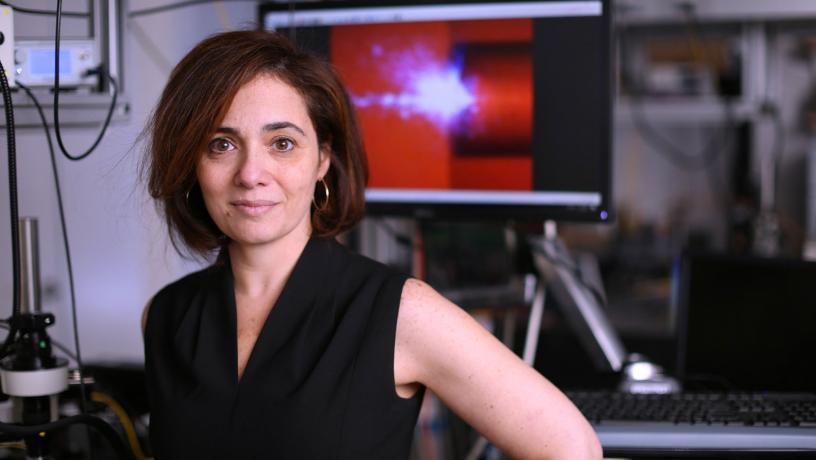Prof. Michal Lipson Named 2021 John Tyndall Award Recipient
Lipson, the first woman to win this award, is honored for her pioneering work in photonics

Michal Lipson, Eugene Higgins Professor of Electrical Engineering and professor of applied physics, has been named the 2021 John Tyndall Award recipient by the Optical Society (OSA) and the IEEE Photonics Society. The first woman to receive the award since its establishment in 1987, Lipson was cited for her “fundamental and technological advances in integrated photonic devices."
The award, one of the highest honors in the fiber optics community, recognizes an individual who has made groundbreaking contributions in any area of fiber optic technology. It is named for John Tyndall, a 19th century scientist who made distinguished contributions to physics, particularly his demonstration of total internal reflection in a continuous stream of water.
“I am so honored and grateful to receive this significant award,” said Lipson, who will receive the Tyndall Award at OFC 2021 (Optical Fiber Communication Conference and Exhibition), the world’s leading conference and exhibition for optical communications and networking professionals, June 6 to 10, 2021, in San Francisco. “This distinction truly recognizes the transformational impact that silicon photonics has had on communications technology.”
Lipson has been a pioneer in advancing the field of silicon photonics, a fundamental technology that uses optical rays to transfer data among computer chips and is now considered to be one of the most promising directions for solving major bottlenecks in microelectronics. She investigates the physics and applications of nanoscale photonic structures and is particularly interested in light-confining structures that can slow down, trap, enhance, and manipulate light.
Lipson’s research is centered on areas where nanophotonics has a big impact, both fundamentally and technologically. Her main focuses include novel photonic materials and fabrication, silicon photonics and non-reciprocity, nano-magnetism and thermal control, nanophotonics for neuroscience, optomechanics, nonlinear and quantum optics, and sensing and optofluidics. Among her many discoveries is the first silicon photonics GHz modulator for transmitting electronic signals over large distances with low power. Her research interests are constantly evolving to keep up with important trends, and her Lipson Nanophotonics Group now includes expertise in areas ranging from imaging of the brain to energy recycling.
Lipson, who joined Columbia Engineering in 2015, has received extensive honors, including election to the American Academy of Arts and Sciences and the National Academy of Science; the Erna Hamburger Award; the IEEE Photonics Award; the NAS Comstock Prize in Physics; an honorary degree from Trinity College, University of Dublin; the Optical Society’s (OSA) R. W. Wood award; MacArthur Fellowship; Blavatnik Award; IBM Faculty Award; and the NSF Early Career Award. In 2020, she was elected OSA 2021 Vice President and will serve as the Society President in 2023.
